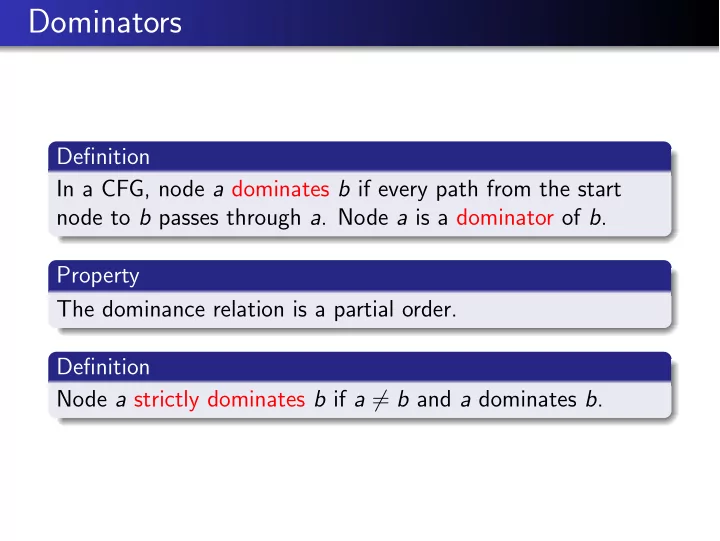

Dominators Definition In a CFG, node a dominates b if every path from the start node to b passes through a . Node a is a dominator of b . Property The dominance relation is a partial order. Definition Node a strictly dominates b if a 6 = b and a dominates b .
Dominators Theorem IF a and b both dominate c , THEN either a dominates b or b dominates a .
Dominators Theorem IF a and b both dominate c , THEN either a dominates b or b dominates a . Corollary Every node n has at most one immediate dominator idom( n ) such that idom( n ) 6 = n idom( n ) dominates n , and idom( n ) does not dominate any other dominator of n .
Dominator Example
Computing Dominators As a dataflow analysis Forwards 1 Lattice is ( P ( Stmts ) , ◆ ) 2 \ 3 out ` = in ` [ { ` } 4 start node value is {} 5 ? = { all statements } 6
Computing Dominators As a dataflow analysis Forwards 1 Lattice is ( P ( Stmts ) , ◆ ) 2 \ 3 out ` = in ` [ { ` } 4 start node value is {} 5 ? = { all statements } 6 More e ffi cient approaches Lengauer-Tarjan: see Appel book section 19.2 Cooper, Harvey, Kennedy: http://www.hipersoft.rice.edu/grads/ publications/dom14.pdf
Dominance Frontier Definition A node w is in the dominance frontier of x if: x does not strictly dominate w , and x dominates a predecessor of w .
Computing Dominance Frontier DF local ( x ): the successors of x not strictly dominated by x . DF up ( y ): nodes in DF ( y ) not strictly dominated by idom( y ). DF ( x ) = DF local ( x ) [ S { y | idom( y )= x } DF up ( y ).
Computing Dominance Frontier Algorithm DF (x): 1: S = {} 2: for all nodes w 2 succ( x ) do if idom( w ) 6 = x then 3: S [ = { w } 4: 5: /* S is now DF local ( x ) */ 6: for all nodes y for which idom( y ) = x do /* below we compute DF up ( y ) */ 7: for all nodes w 2 DF ( y ) do 8: if x does not dominate w or x = w then 9: S [ = { w } 10: 11: return S
Computing Dominance Frontier (Alternative) Restatement of definition of DF w 2 DF ( x ) for every x that dominates a predecessor of w , but does not strictly dominate w . Algorithm Compute DFs (): 1: for all nodes w do for all p 2 preds( w ) do 2: x = p 3: while x 6 = idom( w ) do 4: DF ( x ) [ = { w } 5: x = idom( x ) 6:
Recommend
More recommend